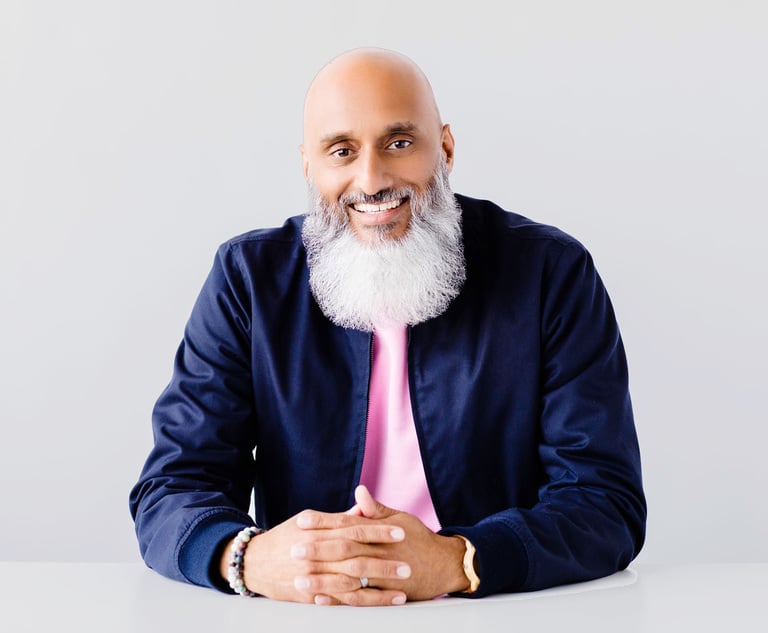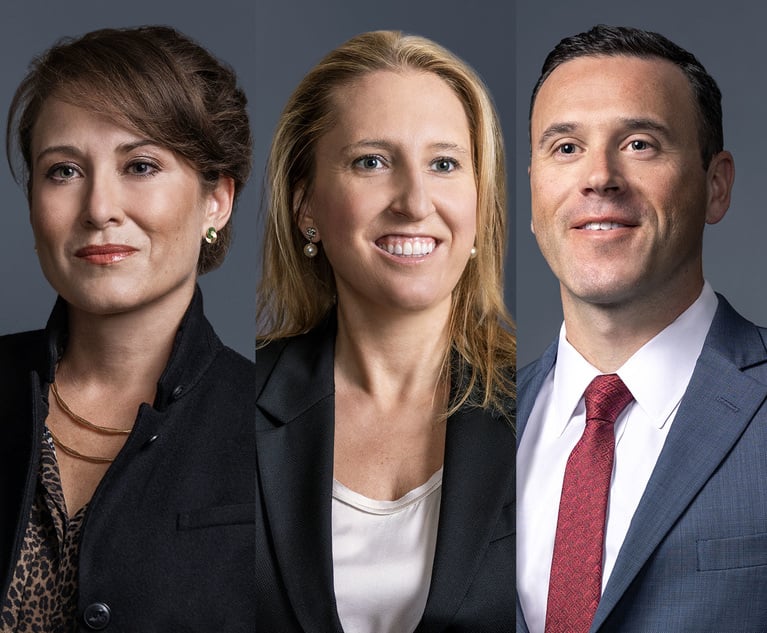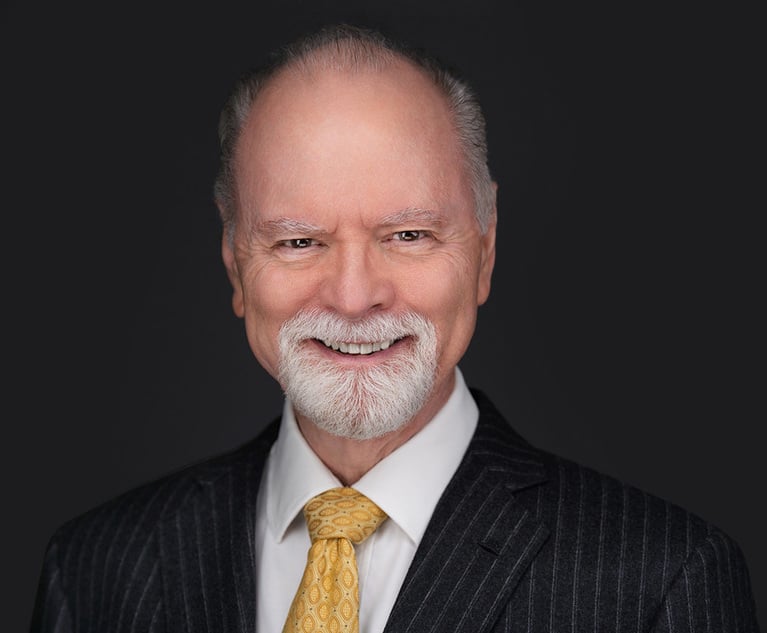Dissecting 'Firm Culture'—What This Term Means for Millennials
Promoting a positive “firm culture” can be of benefit to all employees, millennial or otherwise, and create an environment for better communication and efficiency across the workforce.
February 21, 2019 at 07:32 PM
5 minute read
 Shilpa Coorg from Winston & Strawn
Shilpa Coorg from Winston & Strawn
Most lawyers are familiar with the catch-all term “firm culture,” and the related term “collegial work environment.” These phrases, which appear in nearly every firm's marketing materials, are used to convey that attorneys at that firm are happy. Individuals within firms, however, can often have vastly different perceptions of their work environment depending on a variety of factors, including the individual's own personality, the geographic location of the firm, the size of the firm, and the dynamic of a particular department or practice group, among many other factors. Given these variances, what does the term “firm culture” mean in practicality?
The term “culture” refers generally to the shared values, practices, and beliefs held by a group of individuals in society. Business organizations similarly have certain shared values, practices, and beliefs, which manifest in two separate but interconnected ways: first, the express policies and expectations conveyed by the partnership; and second, the subjective execution of unwritten shared values by individuals with power to set expectations.
Firm culture can be important for many reasons. It is in the best interest of firms to recruit and retain high-caliber attorneys who fit synergistically within the organization. Further, individuals who feel at home in their work environment may be happier, healthier, and more inclined to produce high-quality work product. Both of these factors can and do affect morale, and ultimately, the firm's bottom line.
For millennial attorneys in particular, work environment or culture can be a dispositive factor in whether to join or stay at a firm long term. Some studies have indicated that millennials across a spectrum of industries would be willing to forego nearly $10,000 in annual salary for a better work environment. Indeed, millennials do not shy away from leaving lucrative positions to seek other career opportunities that may better align with their personal and professional goals. Some publications estimate that by age 35, at least a quarter of all millennials will have held five full-time jobs. Many of these moves by millennials across organizations are prompted by factors other than salary alone.
The values millennials have come to appreciate, and in fact, expect, in professional settings often align with factors that can be associated with a positive “firm culture.” As Chambers and Associates has recognized, factors contributing to a positive “firm culture” may include: work-life blend, opportunity for early and substantive work for meaningful cases, training and mentorship, management and communication, feedback and praise, transparency regarding the business, social responsibility, diversity, and emphasis on team work. Similarly, many millennials seek to contribute positively, both in career and society, which means a greater expectation for substantive opportunity as well as an emphasis on pro bono work and volunteer opportunities. Millennials understand that providing high-quality work product is important, but are often unwilling to sacrifice their mental or physical health to do it. They strive to achieve work-life blend. Although millennials seek to work collaboratively rather than hierarchically, they appreciate the benefits of mentorship and guidance.
A majority of these factors can and often are addressed through the express policies and guidance offered by the partnership. These may include, for example, allowances for pro bono work to count as billable hours, flexible work policies with respect to face time or vacation, commitments to increase recruitment and retention of diverse candidates, formalized training or mentorship programs, and standardized annual reviews. All of these values can be expressly conveyed through the policies set by the partnership and can contribute to a perception of a positive “firm culture.”
Some factors, such as management and communication, among others, are more subjective and essentially encompass questions of empathy and social responsibility as carried out by individuals who have the ability to set expectations on behalf of the firm. Are such individuals at the firm genuinely invested in the growth and development of attorneys more than self-promotion? How does the firm handle disputes between two individuals of unequal power? Do individuals at the firm merely pay lip service to stated values such as diversity, or are those values brought to life in meaningful ways on a daily basis? When promoting these more subjective values, a firm is only as strong as the individuals it has recruited at managerial levels.
At its core, a positive “firm culture” can be boiled down to the following: Everyone likes to feel valued and part of a larger, important whole; no one likes to feel dispensable or like a cog on a wheel. Promoting a positive “firm culture” can be of benefit to all employees, millennial or otherwise, and create an environment for better communication and efficiency across the workforce.
Shilpa Coorg is an associate at Winston & Strawn in Los Angeles. She focuses her practice on patent litigation, including pharmaceutical litigation under Hatch-Waxman. She represents and advises industry leaders on intellectual property matters across a broad spectrum of technologies.
This content has been archived. It is available through our partners, LexisNexis® and Bloomberg Law.
To view this content, please continue to their sites.
Not a Lexis Subscriber?
Subscribe Now
Not a Bloomberg Law Subscriber?
Subscribe Now
NOT FOR REPRINT
© 2025 ALM Global, LLC, All Rights Reserved. Request academic re-use from www.copyright.com. All other uses, submit a request to [email protected]. For more information visit Asset & Logo Licensing.
You Might Like
View All

M&A Transactions and AB 1824: Navigating New Privacy Compliance Challenges
7 minute readTrending Stories
- 1How the Court of Public Opinion Should Factor Into Litigation Strategy
- 2Debevoise Lures Another SDNY Alum, Adding Criminal Division Chief
- 3Cooley Promotes NY Office Leader to Global Litigation Department Chair
- 4What Happens When Lateral Partners’ Guaranteed Compensation Ends?
- 5Tuesday Newspaper
Who Got The Work
J. Brugh Lower of Gibbons has entered an appearance for industrial equipment supplier Devco Corporation in a pending trademark infringement lawsuit. The suit, accusing the defendant of selling knock-off Graco products, was filed Dec. 18 in New Jersey District Court by Rivkin Radler on behalf of Graco Inc. and Graco Minnesota. The case, assigned to U.S. District Judge Zahid N. Quraishi, is 3:24-cv-11294, Graco Inc. et al v. Devco Corporation.
Who Got The Work
Rebecca Maller-Stein and Kent A. Yalowitz of Arnold & Porter Kaye Scholer have entered their appearances for Hanaco Venture Capital and its executives, Lior Prosor and David Frankel, in a pending securities lawsuit. The action, filed on Dec. 24 in New York Southern District Court by Zell, Aron & Co. on behalf of Goldeneye Advisors, accuses the defendants of negligently and fraudulently managing the plaintiff's $1 million investment. The case, assigned to U.S. District Judge Vernon S. Broderick, is 1:24-cv-09918, Goldeneye Advisors, LLC v. Hanaco Venture Capital, Ltd. et al.
Who Got The Work
Attorneys from A&O Shearman has stepped in as defense counsel for Toronto-Dominion Bank and other defendants in a pending securities class action. The suit, filed Dec. 11 in New York Southern District Court by Bleichmar Fonti & Auld, accuses the defendants of concealing the bank's 'pervasive' deficiencies in regards to its compliance with the Bank Secrecy Act and the quality of its anti-money laundering controls. The case, assigned to U.S. District Judge Arun Subramanian, is 1:24-cv-09445, Gonzalez v. The Toronto-Dominion Bank et al.
Who Got The Work
Crown Castle International, a Pennsylvania company providing shared communications infrastructure, has turned to Luke D. Wolf of Gordon Rees Scully Mansukhani to fend off a pending breach-of-contract lawsuit. The court action, filed Nov. 25 in Michigan Eastern District Court by Hooper Hathaway PC on behalf of The Town Residences LLC, accuses Crown Castle of failing to transfer approximately $30,000 in utility payments from T-Mobile in breach of a roof-top lease and assignment agreement. The case, assigned to U.S. District Judge Susan K. Declercq, is 2:24-cv-13131, The Town Residences LLC v. T-Mobile US, Inc. et al.
Who Got The Work
Wilfred P. Coronato and Daniel M. Schwartz of McCarter & English have stepped in as defense counsel to Electrolux Home Products Inc. in a pending product liability lawsuit. The court action, filed Nov. 26 in New York Eastern District Court by Poulos Lopiccolo PC and Nagel Rice LLP on behalf of David Stern, alleges that the defendant's refrigerators’ drawers and shelving repeatedly break and fall apart within months after purchase. The case, assigned to U.S. District Judge Joan M. Azrack, is 2:24-cv-08204, Stern v. Electrolux Home Products, Inc.
Featured Firms
Law Offices of Gary Martin Hays & Associates, P.C.
(470) 294-1674
Law Offices of Mark E. Salomone
(857) 444-6468
Smith & Hassler
(713) 739-1250








